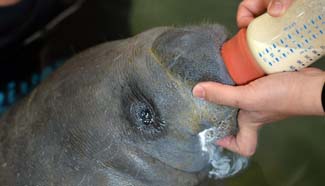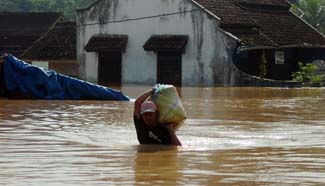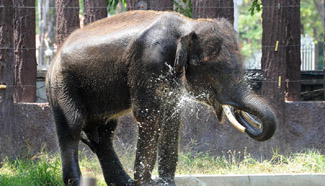The soldier’s surname was Hu. After serving two years at a telecommunications station, he was dispatched to a hill many kilometers from the station base. On the hill is a telephone power supply room, from where military phone lines reached to all corners of China.
Before his deployment to the hill, Hu had raised a dog. His commander, considering the monotony of the posting on the hill and the companionship a dog could provide, approved the dog’s posting with Hu.
Hu named the dog Laoman, and saw him as his comrade-in-arms. They slept in the same room and ate on the same table. Hu shared his food with Laoman. When Hu cooked, Laoman would sit nearby and watch. When the food was ready, Hu would take it to the table. Laoman never hurried to get his share, waiting for Hu to serve him. Hu would divide a steamed bun: half for himself and half for Laoman.
The soldier and the dog would sit atop the hill and gaze at the enormous forests surrounding them when they had time. One small road snaked down the hill. Every ten days or half a month, soldiers from the base would climb the hill, bringing supplies, such as wood, rice, cooking oil and salt.
Such visits were the highlight of life on the hill.
Hu would always make tea in advance and set out the chairs. Seeing Hu make himself busy, Laoman would run around. Like a commander, Hu would wave his hand and command: “Laoman, go find them!” On receiving the order, Laoman would run down the hill and bring back the two soldiers who were sweating after the climb. Laoman was excited, as if all this were for his hard work. Hu poured tea and asked his comrades to sit.
The two soldiers, before drinking the tea, first grabbed Hu’s mail from their bag and gave it to him with newspapers from the past half month. They then took a deep breath, wiped their mouths, observed the sun setting lower, and spoke to Hu. “Hmm, we have to leave before the sun sets completely.” With much reluctance at their departure, Hu said, “Oh! Why leave so early?” But the two soldiers would nod their heads and hurry back to the station.
Hu and Laoman would escort the two soldiers. After walking a short distance, Hu would stop because he could not go too far from his post. He would wave goodbye.
Everyday at 8 p.m. was Hu’s busiest time. That was when soldiers of the telephone traffic unit changed shifts at the station headquarters.
Before handing over to the next shift, the soldiers had to ensure that each line was working by testing voice quality with Hu. This was the only time each day when Hu could talk with other people. All the soldiers of the platoon were women, identified by code numbers, such as 07, 06, 23, and 10. Hu’s code number was 00.
He loved to listen to the women call him by his code name. Their soft voices would greet Hu’s ears: “00, 00, please acknowledge my call!” Hu would reply, “07, roger! Your voice is clear!” 07 said, “Thank you!” before hanging up. Then came the voice of 23. “00, is the voice clear?” He would answer, “Everything is in order!” Then 23 hung up. After testing all the lines, the women were off duty, and another group took over, handling telephone calls across different military area commands.
On his remote and isolated hill, Hu would imagine the faces of the female soldiers from their voices. Were they tall or short, fat or thin? In Hu’s mind, they became real and made faces and joked with him. Then, he could not help laughing at himself for such thoughts. Laoman would look at Hu, confused. Nevertheless, Hu was happiest at that time.
After four full years in the military, Hu found a girlfriend during a visit to his family. His relatives introduced him to many girls, but none impressed him. It was not that the girls were not good, but because he thought their voices did not sound sweet enough. He was used to the voices of the female soldiers, so the voices of other girls sounded somewhat ordinary.
At last Hu met a girl named Yali, whose voice made him feel content. When Hu closed his eyes to listen to Yali, her voice resembled those of the women soldiers. So he became engaged to Yali. The second day after their engagement, he returned to duty. Over the next two years, he wrote constantly to Yali.
Days on the hill went particularly slow. In half a month, Hu could write seven or eight letters. He wrote whatever came into his head. Sometimes he wrote about himself, sometimes about Laoman. He wrote about the stones and trees on the hill and the stars at night. He told Yali all about his life.
Finally he married Yali on a visit to his hometown. He stayed home for just 20 days. Soon after he returned to duty, Yali sent a letter saying she was pregnant. Another 10 months passed, Yali sent another letter telling Hu that they had a son. With the letter was a photo of a chubby baby boy.
After that, Yali would send a new picture of their son from time to time, for which Hu prepared a photo album. It was stuffed full of their son’s photos. When the weather was nice, Hu sat in the sun on the top of the hill and looked through the album, talking to Laoman. “This is my son. Do you know him, Laoman? His name is Zhongqiu. Because my son was born on the day of Zhongqiu (traditional Chinese Mid-Autumn Festival), I named him Hu Zhongqiu. What do you think of the name, Laoman?”
Laoman looked at the pictures, looked at Hu, and wagged his tail. Hu would put his arms around Laoman. “Laoman, you have been with me for eight years on the hill. You are also an old soldier.” As if he understood, Laoman stuck out his tongue and licked Hu’s hand and face when he saw tears in the corners of Hu’s eyes. Hu hugged Laoman: “Oh, Laoman, in this world, it’s you that know me best!”
The day Hu marked eight full years on the hill was also the day that marked his ten years in service. In the autumn, Hu was discharged. He and Laoman went down the hill to the station headquarters. The commander asked Hu if he had any requests before his demobilization. The commander thought eight years on the hill was hard, so he would try to meet any request. To the officer’s surprise, Hu asked to meet the women of the telephone traffic platoon.
Over eight years, he had talked to these women on countless times over the phone, but he had never seen them in person. His biggest wish was to meet these women who had given him his happiest memories. The commander assembled the female soldiers. Standing before them, Hu looked at them carefully. At the beginning of the rank of soldiers, he saluted and said, “00 says farewell to you!” Then he shook their hands and they stated their code numbers for Hu to remember.
Hu’s last wish at the camp was realized.
Before leaving, Hu entrusted Laoman to the company commander. Even though Laoman was not a commissioned soldier, he was deemed an asset of the military because he ate army provisions. The commander promised to care for Laoman.
Finally it was time to depart. Hu told the company commander to hold Laoman tight as he lifted his kit and walked out of the camp. Reaching the gate, Hu turned and looked at Laoman, who was struggling in the commander’s arms. The commander was trying to restrain Laoman. Trying to hold back tears, Hu turned and walked briskly toward the train station, never turning back to see Laoman again.
The second day after Hu left, Laoman disappeared from the hill. The company commander sent soldiers to look for the dog for two days, but Laoman was nowhere to be found. The commander felt sorrow as Hu had entrusted him with the dog.
A month later, the commander received a telegraph from Hu: “Commander, Laoman found me. I tried to send him away, but he would not leave. What should I do? Please tell me!” The commander immediately telegraphed his reply: “Laoman and you have a deep emotional bond. He has traveled over land and water to reach you, which shows his devotion. Laoman is yours. All the best!”

















